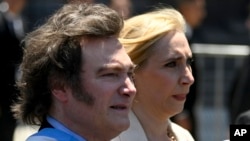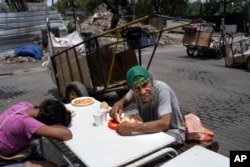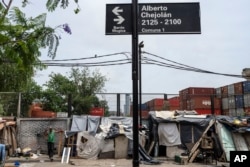Argentina’s new leader, President Javier Milei, has embarked on a series of aggressive steps to refashion the country’s economy since his inauguration on December 10, and according to senior officials in his administration, he is prepared to follow through with his promise to “dollarize” the country’s economy.
Milei takes office at a time when Argentina is experiencing very high rates of inflation, fueled in part by a government that has for years printed money to finance levels of government spending that far exceed its revenues.
An economist by training, Milei has described himself as an “anarcho-capitalist” and a libertarian and came into office vowing to slash the size of government and take drastic, even painful measures to achieve economic stability in his country.
“Our country demands action, and immediate action,” he said in his inaugural address, according to a translation by The Associated Press. “The political class left the country at the brink of its biggest crisis in history. We don't desire the hard decisions that will need to be made in coming weeks, but lamentably they didn't leave us any option.”
Swift action
In the days following his inauguration, Milei began implementing the steps that he believes the country’s economy requires, including an immediate devaluation of the peso, Argentina’s currency, by 54% against the U.S. dollar.
At the same time, Milei’s government canceled price control measures put in place by his predecessor and announced that subsidies for fuel and transportation would also be cut. The response was a sharp increase in consumer prices, at a time when inflation was already very high.
Milei also announced the consolidation of the country’s Cabinet ministries from 18 to nine, and the number of secretariats — areas of authority below the level of government ministries — from 106 to 54. His administration also canceled many public labor contracts and sharply cut government advertising in the media.
Future cost-cutting proposals include reducing transfer payments from the central government to the country’s provincial governments and canceling new infrastructure projects.
Near-term effects
The immediate effect of Milei’s policies will be to accelerate the rate of inflation, which is already well over 100% per year. With the devaluation of the peso and the removal of price controls, ordinary Argentines will likely hurry to convert their existing pesos into tangible goods or foreign currency quickly, which will further hasten price increases.
Officials in Milei’s government have characterized these preliminary steps as emergency measures meant to eventually break the cycle of spiraling inflation, in large part by reducing the government’s fiscal deficit.
However, experts warn that with a badly disordered economy like Argentina’s, measures that might work to stifle inflation under normal circumstances might not be as effective.
'Dollarization' coming
Milei surprised some observers by appointing Luis Caputo as economy minister. A former president of the Central Bank of Argentina, Caputo seemed an unlikely choice, given that another of Milei’s campaign promises had been to do away with the country’s Central Bank.
At first, many speculated that having Caputo in charge of the economy signaled that Milei had not been serious about retiring the Argentine peso and adopting the U.S. dollar as the country’s currency. However, in an interview with the La Nacion newspaper last week, Caputo confirmed that dollarization remains part of the administration’s plans.
“The objective remains the same: to achieve dollarization,” Caputo told the newspaper. “It is the president’s objective, what he campaigned on. The president does not lie. I would like that to be clear, because we must have a real contract with the people.”
Road map to currency change
Steve Hanke, a professor of applied economics at Johns Hopkins University who consulted with the government of Bulgaria on a similar policy shift in the 1990s that successfully ended hyperinflation in that country, said that there is a clear theoretical road map for proceeding with dollarization.
“First, the peso supply should be frozen, with no more new pesos being produced by the [Central Bank] and the peso should be allowed to freely float without restrictions against the U.S. dollar for a 30-day period,” he told VOA in an email exchange.
“After that 30-day period, a determination of the fair value should be rendered,” Hanke said. “Then, the next key step should be taken. The fair peso value should be used as the conversion rate to convert all peso assets and liabilities into U.S. dollars. With that step, Argentina would be officially dollarized.”
Questions about future
Monica de Bolle, a senior fellow with the Peterson Institute for International Economics, told VOA that she is uncertain that Argentina will be able to successfully accomplish dollarization, given the turmoil the economy is in now, and the likelihood that it will get worse before it gets better.
“This is a country that's going to have prices out of control and people out in the streets demonstrating, because the situation is going to be even worse than it is right now,” de Bolle said. “The political support for the Milei government, I'm not sure how that holds together, so it's an absolutely chaotic situation. And you're going to be trying to adopt the dollar in the middle of that?”
She pointed out that currently, the Central Bank doesn’t have enough dollars to convert its existing stock of outstanding pesos.
“You know, Argentina doesn't even have the dollars to do it at the moment, let alone in a more chaotic situation than the one they're facing now. So, it's going to, as I said, it's going to be a mess. ... How they get out of it is really unclear,” she said.
Dollarize now
The uncertain future of the Argentine economy is an argument in favor of dollarizing immediately, said Daniel Raisbeck, a policy analyst on Latin America at the Cato Institute, a libertarian think tank in Washington. The longer the government waits, he told VOA, the worse the fair market exchange rate will be when dollarization becomes inevitable.
As to concerns that there aren’t enough dollars in Argentina to support the change, Raisbeck said that large sectors of the economy are effectively dollarized already. For example, he said that 80% of used-car sales are transacted in dollars, and that a similar percentage of the real estate market is too.
“There are enough dollars in Argentina. It's over 50% of GDP that people have, either under their mattresses, in safe deposit boxes, or abroad,” he said, citing data from Argentina’s National Institute of Statistics. “So, the dollars are there.”
If the government establishes a fixed exchange rate at which the Central Bank will exchange dollars for pesos, then both currencies can circulate simultaneously in the economy for a fixed period, while the peso is gradually removed.
Mehmet Sumer of VOA’s Turkish Service contributed to this report.












